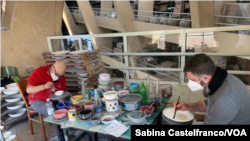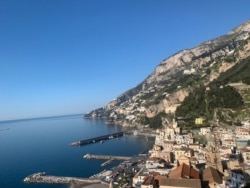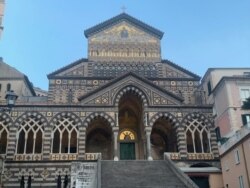For tourists planning a trip to Italy, the Amalfi Coast has been a dream destination. For decades, visitors from around the world have come to this beach resort to enjoy the view from its spectacular coastline and crystal blue waters, its picturesque towns that dot the coast, the friendliness of the locals and the exquisite food.
In the last year, though, the Italian economy has been hard hit by the COVID-19 outbreak with the country’s gross domestic product falling by about $178 million, a drop of 8.9%, according to a report by Legacoop, an association of more than 10,000 companies present throughout the country with activities in all sectors. The report described 2020 “the most catastrophic year in times of peace,” not only for Italy but for the entire world.
The World Tourism Organization said the COVID-19 pandemic brought global tourism to a near-complete standstill, estimating a decline in international tourism of more than 70% in 2020, taking it back to the levels of 30 years ago.
Like major art cities in Italy, the Amalfi Coast was not spared the economic fallout and was hard hit by the lack of tourists. The tourism sector is estimated to have lost about $63 billion in the past year due to travel restrictions imposed to curb the spread of the pandemic. Hotels, restaurants, as well as shops selling handicrafts and souvenirs have been forced to close for weeks and months, resulting in losses to their businesses. In some cases, locals say, up to an 85% loss.
Giovanna Solimene runs a very well-known ceramics factory in Vietri sul Mare, west of Salerno, located at the beginning of Amalfi’s coastal road. Simple designs of typical Amalfi Coast products like its fish and lemons served in colorful plates, cups and jugs have always been a great attraction and popular gifts. She says the last year has been very tough.
It was a year to forget, Solimene said, because work has been much slower and difficult.
Fortunately, online orders kept her business afloat. But many other businesses, Solimene said, were forced to close and are unable to reopen.
Salvatore Aceto is the owner of a large lemon farm that has been in the family for six generations. In normal times, the farm used to produce 50 to 70 tons of lemons per year. This area is well known for its lemons. But according to Aceto, at least half of their business doesn't come from the lemons they grow but from the tourists who visit, many from the United States.
“Amalfi Coast, without tourism, I think, we are most poor because no work, no business, nothing,” Aceto said.
Tourists toured the farm, took cooking classes, and bought produce made with lemon juice or rinds. All of that is now gone. Aceto echoed the sentiments of many in Italy’s Amalfi Coast, saying there is only one way to move forward.
“We are waiting [for] the vaccine,” Aceto said. “Without the vaccine, we can’t restart. Now we need vaccines.”
Although Italy has felt the economic downturn with the drop in numbers of tourists visiting the coastline, both business owners are hopeful that the Amalfi Coastline will bounce back with the vaccine rollout.






